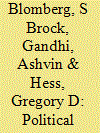| Srl | Item |
| 1 |
ID:
110008


|
|
|
|
|
| Publication |
2011.
|
| Summary/Abstract |
This paper presents an empirical analysis of what drives congressional legislation on terrorism during the period 1995 to 2010. We utilize and augment current methodology to compile and analyze data on sponsorship and cosponsorship of terrorism related data. Our results on the sources of legislation on terrorism are largely in line with past examinations of the importance of committee membership and leadership, party majority-ship, and other political factors. Further, we find that the most significant and robust drive for legislation on terrorism is the September 11th attacks. And while the impact of 9/11 affected legislative productivity everywhere, we find that it most significantly affected states surrounding New York and Washington D.C. Our results indicate that the economy may be one factor motivating politicians to legislate on terrorism; however, these results are not robust.
|
|
|
|
|
|
|
|
|
|
|
|
|
|
|
|
| 2 |
ID:
065779


|
|
|
| 3 |
ID:
106028


|
|
|
|
|
| Publication |
2011.
|
| Summary/Abstract |
Previous research has shown that trust is an important component that encourages investment and capital formation which, in turn, enhances economic performance. This article investigates the effect of terrorism on income, including its indirect role through lowering trust. We consider terrorism as a factor that can increase the cost of investing in technology and capital formation due to its ability to diminish trust in an economy. We then develop a novel and rich dataset spanning 179 countries from 1968 to 2007 using associated community, social, cultural, political, and economic factors from the World Values Survey and international terrorism incidence data from ITERATE. Using empirical tests, we first show that terrorism has a negative and statistically significant impact on individual income. This impact is larger than what has previously been found, possibly due to aggregation effects and data selection. We then estimate the societal impact of terrorism on economic growth by examining the extent to which terrorism taxes trust and how this, in turn, hinders economic performance. Consequently, we develop a measure of the economic consequences of terrorism through sizing the magnitude of the 'trust tax' from terrorism. We find that the trust tax is relatively minor compared to the direct impact of terrorism on income.
|
|
|
|
|
|
|
|
|
|
|
|
|
|
|
|